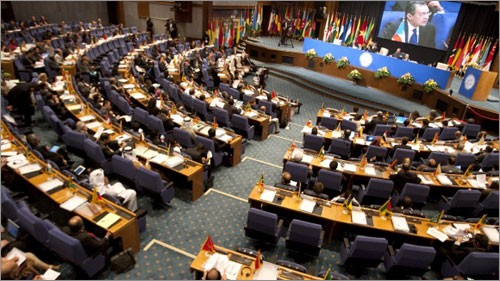(VOVworld) – UN Secretary General Ban Ki-moon and representatives from more than 100 countries and territories have gathered in Iran’s capital city of Tehran for the 16th summit of the Non-Aligned Movement (NAM). As host of the summit, which opened on Thursday, Iran will take over the chair of NAM from Egypt for the next 3 years (2012-2015). Iran is facing opportunities, challenges and an impasse over its nuclear program. Anh Huyen reports.
 |
| NAM meeting in Tehran (Photo: Xinhua news) |
Prior to the summit, NAM’s Senior Official Meeting and the Ministerial Meeting concluded with some important outcomes. Delegates reiterated their determination to pursue peace, fairness and respect of law. Mohamad Mahdi Akhounzadeh, Iran’s Deputy Minister of Foreign Affairs, said these meetings reached an agreement on abolishing all forms of occupation in the world, eliminating nuclear weapons and calling on countries to join campaigns against chemical weapons. In addition, Foreign Ministers discussed proposals condemning the West’s unilateral sanctions against Iran and other countries and asking for a stronger voice for NAM in the UN Security Council and the establishment of a Palestinian State based on the 1967 border line.
During this summit, UN chief Ban Ki-moon will urge Iran to take steps related to its nuclear program, discuss concerns about terrorism and the Syrian crisis, and stress cooperation and progress as prerequisites for regional peace and security.
Apparently, the administration of Iranian President Mahmoud Ahmadinejad has made thorough preparations for the meetings. Despite pressure and sanctions from the US and the West, Iran has taken the advantage of this international forum to enhance its diplomatic position and win support for its peaceful nuclear ambitions. Ahmadinejad has reaffirmed that the West’s unilateral sanctions run counter to UN charter. Tehran expressed its readiness to invite NAM representatives to visit its military zone of Parchin, which the International Atomic Energy Agency (IAEA) suspects of conducting nuclear experiments. The move is Iran’s latest efforts to show the world that its nuclear program is for peaceful purposes.
Iran has multiple aims in hosting the NAM summit. First, with the presence of the UN chief, it hopes to gain support and establish allies in its nuclear standoff with the West. Cairo and Tehran will restore their diplomatic ties after 3 decades of hiatus. The invitation of Egyptian President Mohamed Morsi to the summit marks a shift in Iran’s diplomatic policy, which will give Tehran an additional edge in case of a war with Israel. At the opening ceremony of NAM’s Ministerial Meeting, Egyptian Deputy Foreign Minister Ramzy Ezz El Din expressed his belief that Iran as the Chair of the movement will successfully achieve the set goals, including the reforms of global institutions to meet the interests of all member nations. But this viewpoint has irritated the West. Before Ban’s departure, the US, Canada and Israel called on the UN chief to refrain from attending the NAM summit, saying it will be a “big mistake”. Washington described the handshake between Egypt and Iran as a bad sig, while Tel Aviv has started thinking of new approaches.
The NAM summit will continue until Friday. Tehran’s nuclear standoff with West is nearing a dangerous showdown.